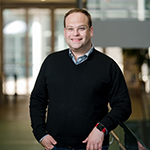Building the Modern Engineering Leader
David Zaretsky’s AI Innovations Lab helps MEM students learn important business skills to prepare them for futures as industry innovators.
To David Zaretsky, it’s nice to excel at playing the tuba. It’s even more impressive to understand how to weave an expert tuba player’s sounds in with the trumpets, clarinets, flutes, and percussion.
That’s the analogy Zaretsky leans on to discuss the purpose of his AI Innovation Lab, an entrepreneurial course he believes can shape the futures for many students in Northwestern's Master of Engineering Management (MEM) program.
 “There's a need for a new type of engineer these days who is not just a coder,” he said. "You need to be an orchestrator, somebody who can understand the big picture and piece things together. That's the future where we're heading.”
“There's a need for a new type of engineer these days who is not just a coder,” he said. "You need to be an orchestrator, somebody who can understand the big picture and piece things together. That's the future where we're heading.”
The engineer of the future is going to rely less on coding skills, which can be more easily replicated by artificial intelligence, and more on a detailed understanding of complex business, client relationships, product management, and more high-level functions, Zaretsky said.
And, he said, that future isn’t far off.
“I use that word ‘future’ very loosely,” he said. “You're going to blink your eyes and by next week something dramatic is going to happen.”
Zaretsky’s course is designed to help prepare the AI neophyte for that dramatic shift. It covers a wide range of topics for students to learn enough about AI and innovation to participate in intelligent conversations and to know the wide variety of tools in the technologist’s toolbox.
One of the goals is to prepare students for more leadership roles, where they will use critical thinking skills to orchestrate the creation of new AI tools and AI-powered agents for the next-generation tech startups.
The 10-week course mixes MEM students with those from other parts of the University. It includes guest lectures that focus on everything from how to launch a startup from the ground up to how to ideate and design a product while communicating effectively with a client.
Zaretsky has professional familiarity with the topics he teaches. He is the CEO and chief scientist for Snips Media, a social media management and monetization platform for influencers. It is the latest venture in a career in engineering-related industries that dates back to the turn of the millennium.
That professional experience has taught him the importance of being able to work with a cross-functional team and is part of the reason he’s happy his course is open to students outside the MEM program.
“You have to wear many different hats and learn how to work in teams and trust your teammates and empower them without stepping on each other's toes,” he said. “These are the skill sets that, unfortunately, many engineers struggle with, so this gives them a real opportunity to step out of their comfort zones and learn how to network and how to be a team leader.”
That experience will leave them more professionally capable, whether they join an existing team or start their own business, Zaretsky said. He added that a look at the syllabus showcases exactly how much important material can be learned in one 10-week class.
“If you are really passionate about entrepreneurship, I want to give you a good head start,” he said. “This course gives students a nice runway to build relationships, network, explore options, and hopefully launch something. It’s there to help students feel confident that they can launch a startup and have the tools and knowledge base to really do what they need to get out there and be successful.”

